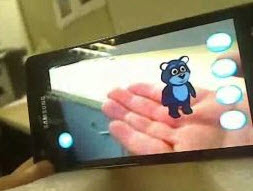Augmented reality set to mesh with mobile commerce
Augmented reality is often considered to be a technology that primarily inhabits the realms of marketing and entertainment. In these two fields, the technology has become exceedingly popular. As augmented reality becomes more popular amongst consumers, retailers are beginning to see the potential of the technology beyond marketing and entertainment. A new survey from the Cardinal Group, a leading provider of shopping technology and security solutions for the retail industry, suggests that mobile commerce may soon merge with augmented reality.
often considered to be a technology that primarily inhabits the realms of marketing and entertainment. In these two fields, the technology has become exceedingly popular. As augmented reality becomes more popular amongst consumers, retailers are beginning to see the potential of the technology beyond marketing and entertainment. A new survey from the Cardinal Group, a leading provider of shopping technology and security solutions for the retail industry, suggests that mobile commerce may soon merge with augmented reality.
Interactive technology growing beyond marketing and entertainment
Augmented reality often garners acclaim because of its dynamic nature. The technology can be used to bring a wide range of digital content to life with high definition, 3D displays. Consumers have come to enjoy the technology for this reason, showing favor for mobile applications that employ augmented reality in an entertaining and practical way. As consumers become more reliant on their mobile devices, augmented reality may begin playing a larger role in the field of mobile commerce, which itself has already become rampantly popular with consumers.
New survey shows consumers are interested in mobile commerce and augmented reality
According to the survey from the Cardinal Group, 55% of shoppers have downloaded a mobile application onto their device, with 51% of these consumers having made a purchase through such applications at some point in their life. The Cardinal Group also employed an augmented reality mirror, called the Virtual Fashion Mirror, at a recent London event, which was used by 87% of those attending. The survey also shows that consumers are growing increasingly interested in the capabilities of augmented reality in mobile commerce.
Future of mobile commerce may become more dynamic
Augmented reality could potential bring a new dynamic to the world of mobile commerce. The retail industry uses augmented reality to sell products in a limited capacity through virtual fashion mirrors similar to the one used by the Cardinal Group. These applications of augmented reality have proven effective in the past, but how the technology will be incorporated into the future of mobile commerce has yet to be seen.
New specifications from the NFC Forum aim to introduce more standardization
The NFC Forum, a non-profit assoc iation that promotes standardization of NFC technology, has released its NFC Controller Interface specification. The report has been made available for use for free in the hopes of expanding awareness of NFC technology and promoting its proper usage. The NFC Forum notes that its latest publication accounts for a “major new specification, created from the ground up.” This new specification is meant to provide more standardization into the realm of NFC technology.
iation that promotes standardization of NFC technology, has released its NFC Controller Interface specification. The report has been made available for use for free in the hopes of expanding awareness of NFC technology and promoting its proper usage. The NFC Forum notes that its latest publication accounts for a “major new specification, created from the ground up.” This new specification is meant to provide more standardization into the realm of NFC technology.
NFC still reliant on standards
NFC technology is still in its infancy, having emerged in 2004, thus thrives on standards that provide a framework for its usage. Standardization is important to ensure a uniform and pleasurable experience with consumers who will use the technology. Without standards, the experiences companies with an interest in NFC technology offer would vary wildly, leaving many consumers without a clear definition of what the technology is or how it should be used. Standardization aims to provide consumers with the best experience possible by encouraging companies to develop services that can be familiar to a wide range of people.
New specification further defines NFC interface
The new specification from the NFC Forum defines a standard interface between NFC devices and a controller, such as a payment terminal or an NFC-enabled appliance. The NFC Forum believes that the new specification is important because it will allow device makers to more easily integrate chipsets from a wide range of manufacturers. Essentially, NFC chip makers are expected to be compelled to make products that can be used on a wider range of platforms rather than on a limited number of mobile devices.
Specification may help companies adopt NFC-based services
The new specifications coming from the NFC Forum will likely have an impact of the mobile commerce industry. The specifications are expected to make mobile payments somewhat more inclusive for a wider range of consumers, but it will also help companies incorporate NFC-based services more easily. These companies will be able to provide consumers with services using a familiar interface, rather than risk introducing a new interface that may not be well received by consumers.
 often considered to be a technology that primarily inhabits the realms of marketing and entertainment. In these two fields, the technology has become exceedingly popular. As augmented reality becomes more popular amongst consumers, retailers are beginning to see the potential of the technology beyond marketing and entertainment. A new survey from the Cardinal Group, a leading provider of shopping technology and security solutions for the retail industry, suggests that mobile commerce may soon merge with augmented reality.
often considered to be a technology that primarily inhabits the realms of marketing and entertainment. In these two fields, the technology has become exceedingly popular. As augmented reality becomes more popular amongst consumers, retailers are beginning to see the potential of the technology beyond marketing and entertainment. A new survey from the Cardinal Group, a leading provider of shopping technology and security solutions for the retail industry, suggests that mobile commerce may soon merge with augmented reality.
 iation that promotes standardization of NFC technology, has released its NFC Controller Interface specification. The report has been made available for use for free in the hopes of expanding awareness of NFC technology and promoting its proper usage. The NFC Forum notes that its latest publication accounts for a “major new specification, created from the ground up.” This new specification is meant to provide more standardization into the realm of NFC technology.
iation that promotes standardization of NFC technology, has released its NFC Controller Interface specification. The report has been made available for use for free in the hopes of expanding awareness of NFC technology and promoting its proper usage. The NFC Forum notes that its latest publication accounts for a “major new specification, created from the ground up.” This new specification is meant to provide more standardization into the realm of NFC technology.